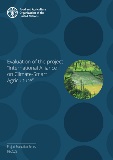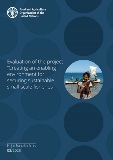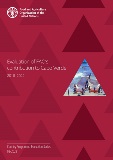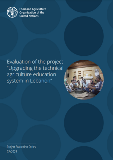Completed evaluations

Evaluation of the project "International Alliance on Climate-Smart Agriculture"
08/03/2023
The project effectively achieved its stated outputs and outcomes and was a key contribution to the international coordination and collaboration on CSA. FAO should consolidate its thought-leadership position in CSA. FAO should also consolidate its institution-wide support to GACSA and GACSA should engage with all relevant FAO divisions of work, from global to local. Finally, FAO should consolidate and scale the project results in Botswana and Ecuador.

Evaluation of the project "Creating an enabling environment for securing sustainable small-scale fisheries"
07/03/2023
It was found that the SIDA-SSF project was robustly designed, relevant and responsive to needs and emerging opportunities to further the implementation of the SSF Guidelines. Recommendations include actions to be taken by the SIDA-SSF project Core Team and FAO.

Evaluation of FAO’s contribution to Cabo Verde 2018–2022
06/03/2023
FAO remains a reference institution for rural development and the country's maritime economy, assisting the country in institutional strengthening. However, critical issues remain regarding FNS governance. FAO played a crucial role in the design and initial implementation of the overall strategic, programmatic and institutional framework of the blue economy. A more incisive contribution to the sector of small/artisanal fishery is needed to address the blue economy challenges.

Evaluation of the project “Upgrading the technical agriculture education system in Lebanon”
17/02/2023
The project aimed to offer access to agricultural technical vocational training to young Syrian and Lebanese students including enrolment in the Lebanese public secondary-level technical degree programme of the technical baccalaureate in agriculture. The evaluation found that the project was highly relevant to the needs of the government and beneficiaries, and delivered on its obligations despite the complexity and the challenging operational environment.

Evaluation of the project “Supporting emergency needs, early recovery and longer-term resilience in the Syrian Arab Republic’s agriculture sector 2017–2020"
06/02/2023
The project aimed to increase food availability for vulnerable households through improved smallholder production, build sustainable access to productive assets, income and food supply, and foster an enabling environment for resilience building and agriculture sector recovery. FAO needs to consolidate its support to communities by selecting specific value chains and adopting an area-based approach in which multiple activities can be layered upon each other leading to more sustainable outcomes.

Evaluation of the project "Cross-cutting: Targeted support for agricultural statistical innovation at FAO"
27/01/2023
The project, active between 2016 and 2021 and funded by the Gates Foundation, aimed at improving effective evidence-based decision-making, policy uptake and influence, and SDG accountability through high-quality, open, accessible, interoperable, timely and more disaggregated agriculture, food security and investment data. The evaluation assessed the quality and relevance of the project design and the extent to which the project has achieved its intended results.

Evaluation of the project “Improving Food Security and Nutrition in the Gambia through Food Fortification”
13/01/2023
This European Union-funded project aimed to improve the nutritional and health status of vulnerable populations suffering from micronutrient deficiencies, particularly women, girls and children, in the Central River Region and the North Bank Region of the Gambia. The evaluation found that the project was relevant as it addressed undernutrition through industrial and biofortification of foods, a globally accepted approach and a cost-effective way to help improve vitamin mineral status.

Evaluation of the project "Strengthening National Forest Inventory and Satellite Land Monitoring System in Support of REDD+ in Bangladesh"
13/01/2023
The evaluation concluded that the new Bangladesh Forest Inventory and Satellite Land Monitoring System developed under this project will greatly improve the consistency and standing of reporting by Bangladesh, including those for forest resources assessment, SDGs and REDD+.

Final evaluation of the project "Legal Technical Accompaniment to the Massive Property Scan for the Social Planning of Rural Property in prioritized municipalities, within the framework of the VGGT"
30/12/2022
This project aimed to support the National Land Agency of Colombia in the implementation of the Massive Property Scan. The purpose was to advance the social system of rural property in three priority municipalities. Good practices highlighted in this project are: the implementation of social cartography; the partnership strategies between government organizations and FAO; the conceptual basis of the communication plan and the technology developed for scalability. (Spanish only)

Terminal evaluation of the project “Forest Resources Assessment and Monitoring to Strengthen Forest Knowledge Framework in Azerbaijan”
22/12/2022
The project objective was to support the implementation of sustainable forest management in Azerbaijan, increase the social and economic benefits gleaned from forests, improve the quality of existing forests, and increase carbon sequestration. The evaluation found that, despite a broad scope, limited timeline and limited resources, the project addressed and secured full achievement of the most strategic parts under two components.
